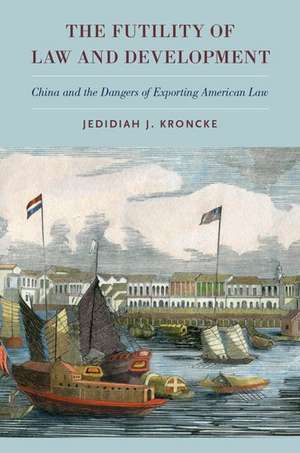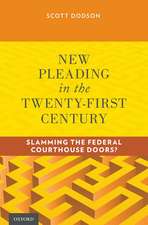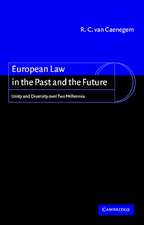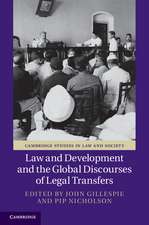The Futility of Law and Development: China and the Dangers of Exporting American Law
Autor Jedidiah J. Kronckeen Limba Engleză Hardback – 11 feb 2016
Preț: 553.70 lei
Preț vechi: 791.95 lei
-30% Nou
Puncte Express: 831
Preț estimativ în valută:
105.95€ • 110.63$ • 87.49£
105.95€ • 110.63$ • 87.49£
Carte tipărită la comandă
Livrare economică 04-10 aprilie
Preluare comenzi: 021 569.72.76
Specificații
ISBN-13: 9780190233525
ISBN-10: 0190233524
Pagini: 374
Dimensiuni: 236 x 155 x 33 mm
Greutate: 0.64 kg
Editura: Oxford University Press
Colecția OUP USA
Locul publicării:New York, United States
ISBN-10: 0190233524
Pagini: 374
Dimensiuni: 236 x 155 x 33 mm
Greutate: 0.64 kg
Editura: Oxford University Press
Colecția OUP USA
Locul publicării:New York, United States
Recenzii
[Futility] is a meticulously documented and ethnographically inspired history of Chinese and American foreign relations. Why do American lawyers export American legal norms, particularly to places with their own rich legal traditions? The answer is as unexpected as it is revelatory...American foreign relations are built upon the meeting of two unexpected forces and disciplines: law and religion...The book is essential reading for comparative legal historians, rule-of-law practitioners, and those who study the impact of law in Sino-American relations.
In this exceptionally sweeping and ambitious book, Jed Kroncke provides a richly researched treatment of the long and eventful engagement of the United States with China and its legal system. The Futility of Law and Development is a historical lamentation for the supposed decline and fall of American legal "comparativism", defined here as a broad-mindedness about and openness to foreign legal ideas and practices. A short review cannot do justice to the analytical subtlety and empirical depth of Kroncke's eight chapters and two exemplary (in both senses of the word) case studies.
It is hard to imagine that any attempt would do justice to the richness of the historical narrative and the complexity of Kroncke's analysis...[he] moves away from the common place criticism that law and development reforms do not work, to ask what law and development scholars may be losing by engaging in its present-day universalism; he concludes that not only are time and money being wasted in failed attempts to export American law abroad, but that the law and development discourse has largely closed the intellectual space for enriching comparative law scholarship...Kroncke provides a passionate call for a return to fruitful comparative exercises, where we all could learn from our differences.
The particular strength of [Kronche's] historical presentation lies in its skillful combination of biographical elements with broader historical dynamics...the Futility of Law and Development is a worthwhile read for all who deal with the ambivalent role of law and legal proselytizing in the nineteenth century and beyond.
Kroncke...provides an extensively researched and well-argued analysis of the misperceptions and missteps associated with US attempts to promote the introduction of a legal system in China based on the US model...Chapters addressing the impact of perceptions regarding the "laws of China" on efforts to understand the evolution of Chinese legal norms - as well as the two case studies involving Frank Goodnow and Roscoe Pound - are particularly insightful in the manner in which they address the missionary zeal of US legal reformers. Kroncke's concluding analysis of US legal reform efforts in China in the post-Maoist period within the context of a messianic past provides important insights.
[Futility] represents a criticism of the traditional methods and approaches of law and development...demonstrating how the fields universalist tendencies and aspirations originated historically through the proselytizing of Protestant missionaries who viewed American law as intertwined with American Christianity...Kroncke's final wish is that one day American law can recover the legal cosmopolitanism of its founding and return to cultivating a more authentic practice of comparative law.
Athough The Futility of Law and Development is primarily a historical work, its contemporary significance is clear. It is a crucial time to reflect on the rocky record of America's engagement with China's legal system. U.S.-China relations stand at a critical juncture with simultaneous substantial interdependence and palpable tension. Members of the U.S. government, nongovernmental organizations, and academia whose work involves China's legal system would be wise to take pause and put The Futility of Law and Development on their bedside tables.
In this exceptionally sweeping and ambitious book, Jed Kroncke provides a richly researched treatment of the long and eventful engagement of the United States with China and its legal system. The Futility of Law and Development is a historical lamentation for the supposed decline and fall of American legal "comparativism", defined here as a broad-mindedness about and openness to foreign legal ideas and practices. A short review cannot do justice to the analytical subtlety and empirical depth of Kroncke's eight chapters and two exemplary (in both senses of the word) case studies.
It is hard to imagine that any attempt would do justice to the richness of the historical narrative and the complexity of Kroncke's analysis...[he] moves away from the common place criticism that law and development reforms do not work, to ask what law and development scholars may be losing by engaging in its present-day universalism; he concludes that not only are time and money being wasted in failed attempts to export American law abroad, but that the law and development discourse has largely closed the intellectual space for enriching comparative law scholarship...Kroncke provides a passionate call for a return to fruitful comparative exercises, where we all could learn from our differences.
The particular strength of [Kronche's] historical presentation lies in its skillful combination of biographical elements with broader historical dynamics...the Futility of Law and Development is a worthwhile read for all who deal with the ambivalent role of law and legal proselytizing in the nineteenth century and beyond.
Kroncke...provides an extensively researched and well-argued analysis of the misperceptions and missteps associated with US attempts to promote the introduction of a legal system in China based on the US model...Chapters addressing the impact of perceptions regarding the "laws of China" on efforts to understand the evolution of Chinese legal norms - as well as the two case studies involving Frank Goodnow and Roscoe Pound - are particularly insightful in the manner in which they address the missionary zeal of US legal reformers. Kroncke's concluding analysis of US legal reform efforts in China in the post-Maoist period within the context of a messianic past provides important insights.
[Futility] represents a criticism of the traditional methods and approaches of law and development...demonstrating how the fields universalist tendencies and aspirations originated historically through the proselytizing of Protestant missionaries who viewed American law as intertwined with American Christianity...Kroncke's final wish is that one day American law can recover the legal cosmopolitanism of its founding and return to cultivating a more authentic practice of comparative law.
Athough The Futility of Law and Development is primarily a historical work, its contemporary significance is clear. It is a crucial time to reflect on the rocky record of America's engagement with China's legal system. U.S.-China relations stand at a critical juncture with simultaneous substantial interdependence and palpable tension. Members of the U.S. government, nongovernmental organizations, and academia whose work involves China's legal system would be wise to take pause and put The Futility of Law and Development on their bedside tables.
Notă biografică
Associate Professor of Law, The University of Hong Kong












